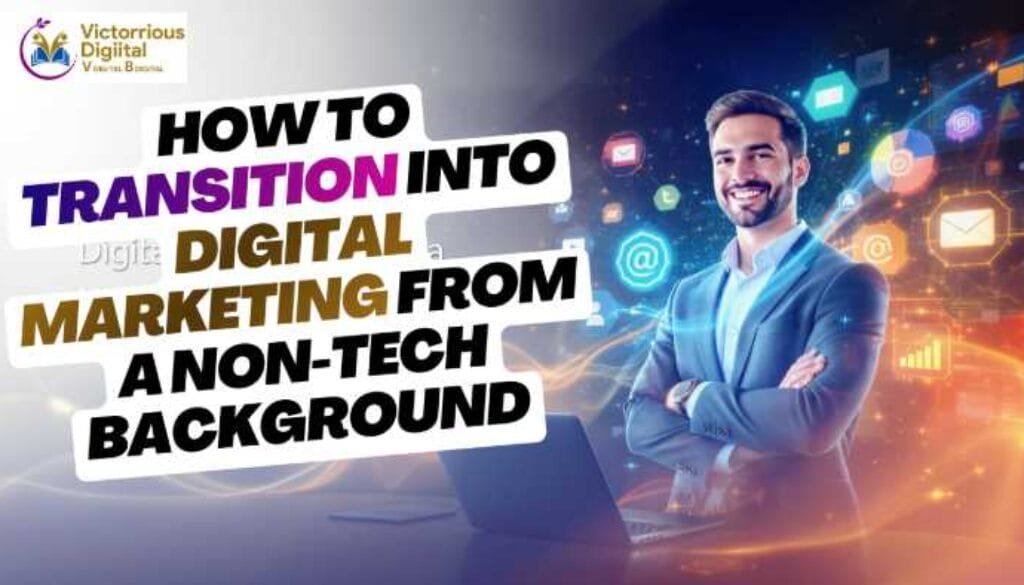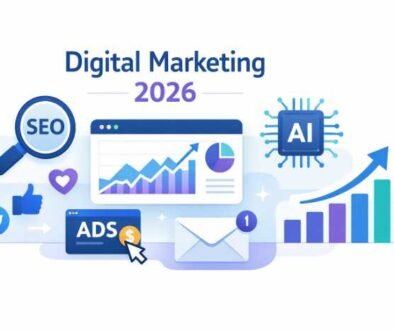Digital Marketing For a Non-Tech Background
Every business, whether a local store or a global enterprise, wants to sustain a digital-first world and build an online presence. It is one of the biggest factors that has created a huge demand for a skilled digital marketer. But don’t worry, if you want to start a successful career in digital marketing, you don’t need to be from a technical background. Whether you are from a commerce, art, management, or even hospitality background, you can seamlessly move to an industry, just learning right away with a learning curve. So if you lack these technical skills, don’t lose hope.
Let’s take a look at how exactly you, as a non-tech professional, can confidently make a move to digital marketing. What is digital marketing? I would like you to get a clear understanding of what exactly digital marketing involves. Some of these channels include Search Engines (SEO and SEM), Social Media: Facebook, Instagram, LinkedIn, YouTube, etc. Email marketing Content Marketing: Blogs, Videos, Infographics, etc. Online Ads: Google Ads, Meta Ads, etc. Affiliate and Influencer Marketing.
In simple terms, this channel helps businesses reach their customers online with the help of data-driven campaigns and innovative strategies. And, you don’t have to be a programmer or have hardcore technical knowledge to do it. You have to understand the working of digital platforms with the help of tools and have strategic communication. Is digital marketing the perfect fit for non-techs? I sense that you have a panic that those tech skills would put you in the backseat. But don’t fear, because… Digital marketing is one such industry that places equal value on creativity, communication, and strategies along with technology. Let us explore why it is the best suit for non-tech.
However, digital marketing involves a lot other than the tasks. Creative field: you get to work on branding, storytelling, and campaign ideas, hence it is perfect for people with artistic or management minds. Analytical but not coding-heavy: you will need to analyze performance data, probably from tools, but not coding. Accessible tools: this is possible since there are beginner-friendly platforms like Google Ads, Meta Business Suite, Canva, among others. Skill-based industry: employers do not care much about your degree but rather what you can do. This implies that you can transfer your existing soft skills into digital marketing from sales, teaching, finance, and even hospitality. Step-by-Step Guide to Transition into Digital Marketing: A Clear roadmap to make the transition confident.
Table of Contents
Step 1: Identify your strengths and interests
Digital marketing has so many branches, and some people may love creativity while others enjoy analytics. Key areas to look at include social media marketing, Search Engine Optimization, content marketing, performance marketing, and email marketing automation.
Step 2: Learn the fundamentals.
To do this, you must take up a course, for instance, an industry-recognized digital marketing course in Pune, to ensure you have structured guidance. Core modules include SEO on-page and off-page, technical basics, Google Ads PPC campaigns, Social Media marketing, content strategy, copywriting, Google Analytics, email marketing, HET, influencer, and affiliate marketing.
Step 3: Get hands-on practice.
Digital marketing is a practical skill. It isn’t enough to read or watch videos; you need to apply whatever you learn. Here is how you can do this: Get your blog website and use SEO techniques. Run small social media campaigns for a local brand or your page. Make use of free tools such as Canva, Google Analytics, Ubersuggest, or Canva. Run demo ads for a small budget and use the techniques to manage campaigns. The more you practice, the more confident you become, and ultimately, you become more confident to get a job.
Step 4: Create a Digital Portfolio.
In case you are new and you don’t have work experience, you can’t miss having done something. Here is what you can include in the online portfolio: Case studies of small projects you have worked on, Sample social media posts or ad creatives, SEO reports/ Keyword research reports, Screenshots of some campaigns that you have run. A good portfolio will impress employers more than a degree.
Step 5: Get Certified
Certifications go a long way in solidifying your proof of your skills. As a beginner who is moving into a new career, here are some certifications you can get: Google Digital Garage Certificate, Meta blueprint certification HubSpot content marketing certificate Certified in Google Ads Digital Marketing Professional Certification8—Victorious Digital * Asides proving that you know what you are doing, certifications prove to employers that you are serious in your quest to build a new career.
Step 6: Start Freelancing or Interning.
Getting the basics will excite you and make you yearn to test your skills. Some of the things you can For example, you can be a digital marketing intern for a local business. Offer freelance services to small businesses and startups. Collaborate with entrepreneurs or friends * Even if the pay isn’t good at the start, the experience you get is invaluable.
Step 7: Network and remain updated
Digital marketing is an ever-changing industry. What was relevant last year may not work now. Join digital communities and webinars
Attend local events or workshops
Keep experimenting with new tools like AI-driven content, automation, and analytics.
Tip: Networking with professionals can open the door to new projects and full-time opportunities.
Overcoming Common Fears as a Non-Tech Professional. Many people hesitate to switch careers due to self-doubt or myths.
Let’s address a few:
Myth 1: “I don’t know coding, so I can’t do digital marketing.”
➤ Most roles don’t require coding at all. A basic understanding of HTML or WordPress is enough.
Myth 2: “I’m from a completely different background, it’s too late.”
➤ Many successful digital marketers started after years in other careers. Learning never stops!
Myth 3: “I need a marketing degree.”
➤ Employers value skills and portfolio over degrees.
A good certification and real project work wonders.
Career Opportunities in Digital Marketing. After completing your learning and practice, you can explore multiple career paths, such as:
- SEO Executive
- Social Media Manager
- Google Ads Specialist
- Content Writer / Strategist
- Email Marketing Executive
- Digital Marketing Manager
- Freelance Consultant
With experience, you can even start your own digital marketing agency or become a trainer. The salary range for beginners in India starts from ₹20,000 – ₹35,000 per month and grows rapidly with skills and experience.
Conclusion:
Start Small, Think Big Transitioning into digital marketing from a non-tech background is not only possible – it’s one of the smartest career moves in today’s world. The industry welcomes professionals who are curious, creative, analytical, and eager to learn. All you need is the right training, consistent practice, and willingness to adapt.
If you are willing to go the distance, do not hesitate to enroll in Victorious Digital – Digital Marketing Course in Pune or other prestigious institutes; it would be your first stepping stone into the world of marketing. Rest assured that expert mentoring, live projects, and placement support would help you carve the path for your new career without any hurdles. In Conclusion, “You don’t need a technical background to thrive in digital marketing. You just need the courage to start and the consistency to grow.
Also Read : Digital Marketing Careers Abroad Opportunities & Challenges




